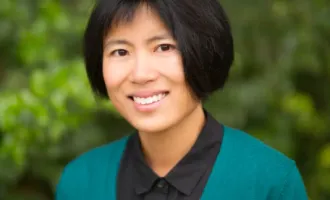Graduate Division Alumni Seminar Series: Learn about the careers of our Ph.D. alumni
UCSF’s Graduate Programs are renowned for producing outstanding scientists, armed with rigorous research training and ready to address the most pressing scientific problems of our time. While these skills form the foundation for many successful research careers, a recent study showed that only 15 percent of basic science Ph.D.s are tenured at an R1 institution six years post-graduation1. This indicates that many Ph.D. alumni are choosing to work in other sectors outside academia. These include careers in science policy, consulting, law, government and the nonprofit sector.
Faced with this array of choices, it can be challenging for current Ph.D. students to determine the best career for their interests and lifestyles. In response, two fourth-year graduate students have launched a seminar series to promote student engagement with alumni and provide students with an opportunity to learn more about their post-graduate career options.
The Graduate Division Alumni Seminar Series was born out of a meeting in 2013 with the directors of the Biophysics and Biomedical Informatics Ph.D. programs, Matt Jacobson and Patsy Babbitt. During this meeting, the directors asked students how UCSF could better serve the interests and needs of its graduate students. It became clear that students were eager to gain real-world exposure and interact with professionals pursuing a variety of career paths. This would, in turn, inform their own decisions regarding postgraduate plans and allow them to better position themselves for the job market.
Beginning in the fall of 2013, the series has welcomed alumni speakers pursuing a wide range of careers. These include the founder of a biotech company developing synthetic biology technologies for alternative fuels production; the director of structural biology at Genentech; a biophysics Ph.D. turned patent lawyer, who is now patent counsel for eBay; and a founding member of the UCSF Entrepreneurs in Biotechnology Club, who has since founded his own asset-management firm. Through these diverse speakers, students have been able to learn about a wide range of careers paths and network with successful alumni. Additionally, it has served as a valuable opportunity for alumni to reconnect with the UCSF community and share their experiences with young scientists.
While the seminar series began within the Biophysics and BMI Ph.D. programs, its founders, fourth-year students Amy Chang and Tara Friedrich, recently decided to expand the series to the Graduate Division at large so that more students could benefit from this valuable resource. With support from the Biophysics and BMI Ph.D. programs, the Graduate Division Alumni Association and the Associated Students of the Graduate Division, they are launching Graduate Division-wide seminars in the spring of 2015. They have invited alumni speakers from across the Graduate Division and welcome all members of the UCSF community to attend.
The next seminar is on March 2 at 7p.m. in the Helen Diller Cancer Center Auditorium (Mission Bay), and the featured speaker will be Jed Pitera. Pitera received his Ph.D. working with Peter Kollman and is now a research staff member in Science and Technology at the IBM Almaden Research Center, where he uses computational simulations to answer questions in protein folding, polymer self-assembly and materials design. Jed is also adjunct assistant professor at UCSF and actively collaborates with groups at UCSF and Stanford.
Seminars are held during the academic year on the first Monday of each month at 7 p.m. at the Mission Bay campus. Food and drinks are served. To see a list of past and upcoming speakers, visit biophysics.ucsf.edu/seminars-events/ipqb-alumni-speaker-series. We will also be posting seminar announcements to Student Life’s Student Inside Guide.
If you have questions or would like to receive seminar announcements, please contact Amy Chang at achang@ucsf.edu.
Reference: 1. Cyranoski et al. Education: The Ph.D. factory. Nature, 472, 276-279 (2011).

